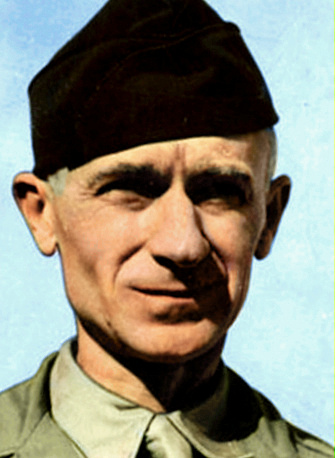
Roving Reporter
By Ernie Pyle
In addition to today’s column, we will print several others which we have received from Ernie on Okinawa. We believe he would have wanted it this way.
OKINAWA (by Navy radio) – Now I’ve seen my first Jap soldiers in their native state – that is, before capture. But not for long, because the boys of my company captured them quicker than a wink.
It was mid-forenoon and we had just reached our new bivouac area after a march of an hour and a half. The boys threw off their packs, sat down on the ground, and took off their helmets to mop their perspiring foreheads.
We were in a small grassy spot at the foot of a hill. Most of these hillsides have caves with household stuff hidden in them. They are a rich field for souvenir hunters. And all Marines are souvenir hunters.
So immediately two of our boys, instead of resting, started up through the brush, looking for caves and souvenirs. They had gone about fifty yards when one of them yelled: “There’s a Jap soldier under this bush.”
We didn’t get too excited for most of us figured he meant a dead Jap. But three or four of the boys got up and went up the hill. A few moments later somebody yelled again: “Hey, here’s another one. They’re alive and they’ve got rifles.”
So, the boys went at them in earnest. The Japs were lying under two bushes. They had their hands up over their ears and were pretending to be asleep.
Too scared to move
The Marines surrounded the bushes and, with guns pointing, they ordered the Japs out. But the Japs were too scared to move. They just lay there, blinking.
The average Jap soldier would have come out shooting. But, thank goodness, these were of a different stripe. They were so petrified the Marines had to go into the bushes, lift them by the shoulders, and throw them out in the open,
My contribution to the capture consisted of standing to one side and looking as mean as I could.
One Jap was small, and about 30 years old. The other was just a kid of 16 or 17, but good-sized and well-built. The kid had the rank of superior private and the other was a corporal. They were real Japanese from Japan, not the Okinawan home guard.
They were both trembling all over. The kid’s face turned a sickly white. Their hands shook. The muscles in the corporal’s jaw were twitching. The kid was so paralyzed he couldn’t even understand sign language.
We don’t know why those two Japs didn’t fight. They had good rifles and potatomasher hand grenades. They could have stood behind their bushes and heaved grenades into our tightly packed group and got themselves two dozen casualties, easily.
The Marines took their arms. One Marine tried to direct the corporal in handbook Japanese, but the fellow couldn’t understand.
The scared kid just stood there, sweating like an ox. I guess he thought he was dead. Finally, we sent them back to the regiment.
The two Marines who flushed these Japs were Cpl. Jack Ossege of Silver Grove, Kentucky, across the river from Cincinnati, and Pfc. Lawrence Bennett of Port Huron, Michigan.
His first blitz
Okinawa was the first blitz for Pvt. Bennett and this was the first Jap soldier he’d ever seen. He is 30 years old, married, and has a baby girl. Back home he was a freight dispatcher.
The Jap corporal had a metal photo holder like a cigarette case. In it were photos which we took to be of three Japanese movie stars. They were good-looking, and everybody had to have a look.
Cpl. Ossege had been through one Pacific blitz, but this was the first Jap he ever took alive. As an old hand at souvenir hunting, he made sure to get the Jap’s rifle.
That rifle was the envy of everybody. Later when we were sitting around, discussing the capture, the other boys tried to buy or trade him out of it. “Pop” Taylor, the black-whiskered corporal from Jackson, Michigan, offered Ossege $100 for the rifle.
The answer was no. Then Taylor offered four quarts of whiskey. The answer still was no. Then he offered eight quarts. Ossege weakened a little. He said, “Where would you get eight quarts of whiskey?” Pop said he had no idea. So, Ossege kept the rifle.
So, there you have my first two Japs. And I hope my future Japs will all be as tame as these two. But I doubt it.

